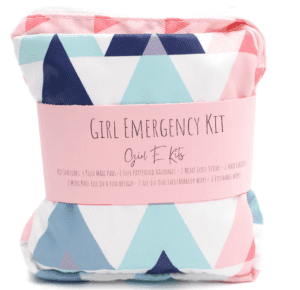The post How to Talk to Our Kids about Periods appeared first on The Mabelhood.
]]>The conversation starts at home, but for many women it’s a difficult one to broach. This comes down to how we were taught about our periods. It can bring up awkward feelings and memories and emotions that come from the way the message was given to your as a little girl. In previous generations the topic wasn’t raised until a girl gets her period, at which time her mother would quickly show her how to use a pad, and that’s the last time it’s discussed. No talk about how it will make you feel, how long it will last, what product options are or even how long it will last. I’ve heard countless stories of girls who were never told it would be a monthly occurrence- and they were shocked (and disappointed) when it returned the following month.
It can hard work to break this negative cycle, but we must make changes for our own kids. And for the most part, many women are starting to talk openly about it. Even television advertisements have finally stopped using blue washer fluid to demonstrate blood. So regardless of how you were raised, or how deep the shame goes, it’s important that we talk openly about menstruation with our kids.
Here are some tips to opening up the conversation and keeping it open:
Start early.
Keeping it age appropriate, be honest and open. If your toddler asks why your have a string, or sees blood in the toilet. Answer honestly, “that’s mommy’s period” simple and matter of fact. They may a have a follow up question, but often toddlers feel happy enough with the answer provided.
Normalize it.
Don’t feel the need to keep your hygiene products hidden away in the back of the cupboard, or only buying them when you’re alone. Normalizing will eliminate any stigma.
Be honest.
We must be positive about our periods to be able to not be embarrassed by our bodies. We have to make sure that we’re proud of our bodies and what they can accomplish. Having said that, it’s not always fun, and we must be honest. Share when you’re not feeling your best, when your uncomfortable or moody. Honesty, about it is crucial to destigmatizing without making girls feel as though it will always be a beautiful thing.
Demonstrate.
Show your kids that when you’re not feeling top-notch that you take time to care for your body. Demonstrate how exercise can help, or some alone time watching a movie, or a healthy meal, or mediate or take a walk. Demonstrate healthy ways you care for your body to make sure you’re feeling your best physically and mentally.
Tell your story.
Share the story of when you got your first period. You can either save this for when your daughter gets hers or share another time. But it’s important for her to hear that you’ve been though it too.
Talk about choices.
Show your daughter the different options. Share with her some info on pads vs tampons vs cup. Share the pros and cons, talk openly about how they’ll effect the environment, or the convenience of each one. Let her learn to make informed decisions about her body, her choices, and the options available to her. Shop for some period-proof underwear together.
Keep the narrative going
Overall, talking openly to our kids about their periods doesn’t need to be an event, where we sit and have the talk, it’s about always being open approachable about the topic. Talking about it in daily life, normalizing it and making it an ongoing narrative. The more open we can be, the better we’ll be at eliminating shame and embarrassment for the next generation, and allowing our girls to have a healthy relationship with their bodies.
Looking for more?
Here are some additional helpful tips, especially for dads to help their daughters through puberty. And another great read about eliminating period shame.
The post How to Talk to Our Kids about Periods appeared first on The Mabelhood.
]]>The post 6 Ways Dads Can, and Should, Support Their Daughters throughout Puberty. appeared first on The Mabelhood.
]]>It hit me hard when I learned that 3 out of 10 girls experience puberty at the age of 8. That means you only spend about 8-10 years parenting your little girl. The rest of the time, you’re parenting your daughter as a woman. So, it’s about time we focus on what it means to parent a young woman.
Did you know? Studies have shown that since the covid pandemic, the age of puberty has decreased.
you only spend about 8-10 years parenting your little girl. The rest of the time, you’re parenting your daughter as a woman
Unfortunately, it’s common for Dads to withdraw from their daughters as they go through puberty. What was once a strong, loving relationship somehow changes as our girls develop. Most Dads step back because this is all ‘girl stuff’; this couldn’t be farther from the truth. The more dads “get out of the way,” the more our girls feel ashamed about the changes they’re going through and are made to feel they’re no longer lovable to their dads.
Dads feel uncomfortable, and step-back and daughters perceive this as rejection. From there, the relationship can crumble, and what once was a loving bond is gone. Dads, we need to make sure this doesn’t happen; it’s up to us to put our embarrassment aside for the sake of our girls. We need to break the cycle.
Here is what I’ve learned from raising girls going through puberty (yes, we’re as strong as ever!):
Start talking to your girls when they are young
Young girls are naturally inquisitive, which should be used to your advantage. Start by talking about periods and the changes bodies undergo at a young age. Keep the conversation age-appropriate. They’re not yet embarrassed, ashamed, or even aware of the taboo of talking about bodies, so they’ll ask questions openly. You need to make the most of these teachable moments, not only for the facts but for letting your daughter know you’re always available to discuss the topic.
Inform yourself about your daughters puberty
Make sure you know what you’re talking about. Read THIS, research products, and make sure you have answers to common questions. If you don’t know the answer, admit it. Feel free to say, “I’m not sure. Let’s call Aunt Becky,” or “let’s check with mom.”
Make yourself aware of what the extra estrogen in their body can cause, like heavy periods, painful periods, moodiness, bloating, water retention, and other symptoms that can make your daughter feel the pits. Being aware of this allows you to be a more understanding father and be able to sympathize and help where needed.
Find companies with subscription boxes (dad of the year!) Read books and inform yourself. This Canadian brand, is amazing to buy (if you’re from Canada) as your daughter’s body starts to change and you need her to be prepared. 
Stay positive and loving to your daughters, always
If this time feels confusing to you, imagine how it must feel to her. It’s essential that during the time while her body is changing, she isn’t also feeling like her dad is withdrawing or pulling away. She’s already feeling uncomfortable in her skin and making comparisons with her friends. She needs your love to be unconditional.
Know how to help your daughter through tough days
If she’s feeling down, ask if she wants a heating pad for cramps, make her a healthy smoothie, or offer a bar of chocolate. Validate her feelings, help ease symptoms, and show you will make her feel connected to you and make her feel loved. This also teaches her to find a partner who respects and cares for her.
Compliment her on all the things she does well
Compliment her on the things she does well. High-five her, uplift her, hug her and respect her. Remind her how loved she is. Girls can feel so awkward and uncomfortable in their bodies. They may worry that the changes mean you won’t love them as they did when they were little girls. Make sure to show them that this isn’t the case. The relationship will be different but can remain just as strong.
A good time for dad jokes
The topic of puberty can be awkward for kids and teens, so now may be the perfect time to inject some of your terrible dad jokes. Sure, your kid will roll her eyes. But you’re letting her know the relationship remains strong; it will ease the tension and let her know it’s okay to laugh and joke about big topics, making her more likely to approach you when she may need you again.
When girls feel loved and respected by important men in their life, she has higher self-esteem, holds higher standards and self-respect, and embraces her womanliness with open arms, not shame. So never underestimate the role you play as her dad. This is not a time to step aside. It’s a time to step up and embrace the awkwardness and embarrassment head-on. It will be challenging but being by her side and supportive as she stumbles through and showing her how much you adore her support her, and respect the woman she is becoming. You will benefit immeasurably from the changes as you’ll now be parenting your daughter as a woman, which is incredible to be a part of.
Another great read for dads in the Mabelhood- Please don’t stop hugging your sons 
The post 6 Ways Dads Can, and Should, Support Their Daughters throughout Puberty. appeared first on The Mabelhood.
]]>